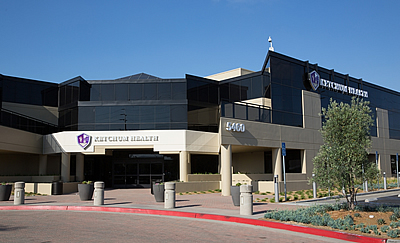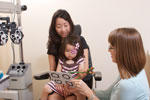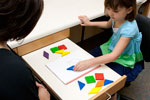Residency Programs
Residency in Pediatric Optometry, Vision Therapy and Vision Rehabilitation
University Eye Center at Ketchum Health

Established: 1978
Positions: Two
University Eye Center (UEC) at Ketchum Health
Southern California College of Optometry at Marshall B. Ketchum University
5460 E. La Palma Ave.
Anaheim, CA 92807
PROGRAM FACULTY
Residency Coordinator: Angela Chen, OD, MS, FAAO*
Attending Faculty Members
- C. Troy Allred, OD
- Surbhi Bansal, OD, FAAO, FOVDR
- Natalie Breau, OD, FAAO
- Steven Chang, OD, FAAO
- Susan Cotter, OD, MS, FAAO*, FOVDR
- Silvia Han, OD, FAAO, FOVDR
- Kristine Huang, OD, MPH, FAAO
- Rachelle Lin, OD, MS, FAAO
- Eunice Myung Lee, OD, FAAO
- Reena Patel, OD, FAAO
- Jillian Youngerman, OD, FOVDR
*Diplomate, Binocular Vision, Perception & Pediatric Optometry
 |
 |
 |
 |
MISSION STATEMENT
The mission of the Pediatric Optometry, Vision Therapy and Vision Rehabilitation (POVT) residency is to develop the residents’ clinical expertise in providing an advanced level of care through broad, concentrated clinical experiences encompassing diagnosis and management skills in pediatric optometry, binocular vision, and visual perception.
PROGRAM DESCRIPTION
The POVT Residency is based at the University Eye Center at Ketchum Health, a fully-equipped patient care facility owned and operated by the Southern California College of Optometry at Marshall B. Ketchum University (SCCO at MBKU). The residency is a full-time, formal, supervised program combining patient care, didactic education, teaching experience, and scholarly activities.
PROGRAM GOALS & OBJECTIVES
Goal 1: To enhance the residents’ knowledge and clinical expertise in the evaluation, diagnosis, and management of children of all ages in a primary care setting.
Objectives:
- The residents will provide a minimum of 150 primary care eye examinations for children of all ages, including infants and toddlers.
- The residents will examine, diagnose, and develop management plans for children with various visual conditions, including but not limited to significant refractive error, binocular vision anomalies, and pediatric ocular diseases.
Goal 2: To enhance the residents’ knowledge and clinical expertise in the evaluation, diagnosis, and management of binocular vision and visual information processing disorders.
Objectives:
- The residents will demonstrate enhanced skills in the performance and interpretation of tests to evaluate ocular motility, accommodation, non-strabismic and strabismic binocular vision disorders, amblyopia, and visual information processing disorders.
- The residents will complete a minimum of 100 patient encounters evaluating and/or managing patients with ocular motility, accommodative, and/or non-strabismic binocular vision disorders.
- The residents will complete a minimum of 100 patient encounters evaluating and/or managing patients with strabismus and/or amblyopia.
- The residents will complete a minimum of 75 patient encounters evaluating and/or managing patients who have visual information processing disorders.
Goal 3: To enhance the residents’ knowledge and clinical expertise in the evaluation, diagnosis, and management of patients with developmental disabilities or acquired brain injury, children with visual impairment, and children who need specialty contact lens fits.
Objectives:
- The residents will provide comprehensive eye care for patients with neurodevelopmental disorders (e.g., Down syndrome, autism, and cerebral palsy).
- The residents will provide comprehensive services including vision therapy when applicable for patients who have acquired brain injury.
- The residents will rotate through specialty clinic (e.g., Beyond Blindness) to develop the knowledge and skills necessary to treat and manage children with visual impairments.
- The residents will examine and perform contact lens fittings for children who require specialty contact lenses.
Goal 4: To enhance the residents’ communication skills with other professionals for well-coordinated patient care.
Objectives:
- The residents will participate in a clinical rotation in which they interact with pediatric ophthalmologists.
- The residents will participate in a clinical rotation in which they interact with other professionals (e.g., education, occupational therapy) who commonly work with children who have developmental disabilities.
- The residents will have the opportunity to interact with school district personnel and participate in Individualized Education Plan (IEP) meetings.
- The residents will develop the ability to communicate effectively in writing with referring optometrists, other health care providers, and professionals outside of the health care field.
Goal 5: To promote the concept of life-long learning and interest in optometric education, clinical research, and/or developing further expertise and credentials (American Academy of Optometry’s Diplomate in Binocular Vision, Perception & Pediatric Optometry Section and the College of Optometrists in Vision Development’s Fellowship).
Objectives:
- The residents will be provided with 4 hours each week to engage in scholarly activities.
- The residents will attend the monthly Pediatrics and Vision Therapy Department Journal Club and present at a minimum of 8 of the meetings.
- The residents will give at least 1 oral presentation (e.g., case presentation in a course or present at the annual Residency Forum) to optometry students or optometrists.
- The residents will be encouraged to attend scientific meetings and submit an abstract for such meetings.
- The residents will have the opportunity to participate in on-going clinical research projects or conduct their own research project, if desired.
- The residents will have the opportunity to teach in laboratories that pertain to strabismus, vision therapy, and visual information processing to develop their academic- based teaching skills.
- The residents will supervise optometry students in the vision therapy and / or pediatric optometry services to develop their clinical teaching skills.
RESIDENCY SCHEDULE
The length of the program is 12 months and 1 week. The residents will start the last full week of June; this gives a one-week overlap between the outgoing and incoming residents to streamline the transfer of patient care. The residency end date is June 30 of the following year.
The residents are given a schedule on a quarterly basis, which coincides with the College’s academic calendar. The schedule has various on-site specialty care clinical assignments, lab assignments, course auditing assignments, external rotation assignments, and patient care assignments. In addition, the schedule sets aside time for weekly consultation with faculty and time for scholarly activities. The service administrative assistant then fills in the patient assignments with supervision and assistance from the coordinator.
On-site specialty clinical assignments include:
- Acquired Brain Injury: 2 hours per week for 12 months
- Disability & Accessibility Clinic: 3.5 hours per week for 12 months
- Pediatric Contact Lens: 4 hours per week for 6 months
External rotation assignments include:
- Beyond Blindness: 3.5 hours per week for 6 months
- Pediatric Ophthalmology Observation: daily for 2 weeks
- University Eye Center Los Angeles: duration varies depending on space and staff availability
Depending on the quarter, a resident schedule may resemble the following:

RESIDENCY ACTIVITIES
Clinical Activities:
- The residents provide direct patient care, under the supervision of expert faculty in clinical diagnosis and management. Activities include:
- Primary vision care for well, at-risk, visually impaired, and/or developmentally disabled infants and children.
- Evaluating patients with ocular motility, accommodative, and visual information processing deficits and then providing optometric care as well as any multidisciplinary referrals.
- Evaluating patients with binocular vision disorders (strabismic and non-strabismic) and/or amblyopia and providing comprehensive care using options such as passive therapy (e.g., lenses, prisms, occlusion, etc.) and active vision therapy (vision training procedures).
- Evaluating and fitting pediatric contact lenses for children who need specialty contact lenses.
- Providing pediatric low vision services for children with visual impairment.
- Providing comprehensive services for patients who have acquired brain injury.
- Providing myopia management services with various treatment modalities.
- The residents have a rotation to observe pediatric ophthalmologists to learn about ophthalmological perspectives in management of binocular vision anomalies and pediatric eye diseases.
- The residents co-manage patients with members of other disciplines and learn the necessary logistics of multidisciplinary care and the need for inter-disciplinary communication.
- The residents are assigned to serve as a Clinic Preceptor for one clinic session (1/2 day) for a minimum of two quarters. Additional precepting assignments can be arranged, depending on the resident’s interests.
- Each resident is assigned with 1 week per month “on-call” responsibility in the University Eye Center Emergency Service.
Didactic Activities:
- The program includes weekly consultation meetings with the Pediatric Optometry and Vision Therapy Residency faculty, in the following content areas:
- Pediatric primary care diagnosis, treatment strategies, and management
- Binocular vision diagnosis, treatment strategies, and management
- Visual and developmental milestones in infancy and early childhood
- Common developmental anomalies in infants and children
- Visual information processing diagnosis, treatment strategies, and management
- The residents have access to additional faculty with expertise in specialty areas such as contact lenses, ocular disease, and low vision.
- The residents will attend courses 771: Vision, Perception and Learning, 772: Strabismus/Amblyopia Diagnosis, and 773: Strabismus/Amblyopia Management.
- The residents will assist the assigned faculty as a laboratory instructor in Courses 771: Vision, Perception and Learning and 772: Strabismus/ Amblyopia Diagnosis. Co-teaching as a laboratory instructor in course 672: Management of Non-Strabismic Binocular Vision Conditions is optional.
- The residents will attend faculty taught seminars in Special Education, Sports Vision, Acquired Brain Injury, and Disability & Accessibility. Additionally, discussions on topics such as myopia management, genetic testing, and aniseikonia management will be included.
Scholarly Activities:
- The residents meet monthly for Journal Club, where various scholarly articles are presented. The residents are assigned to present one article per month and will give a minimum of 8 presentations at Journal Club.
- In addition to Journal Club reading assignments, the faculty mentors assign various articles and chapters to read to enhance patient care.
- The residents are encouraged to attend scientific meetings (e.g., AAO, OVDRA). In addition, the residents are encouraged to attend various local education meetings and continued education held at the College.
- The residents are encouraged to submit scientific abstracts for paper or poster presentations at the AAO and/or OVDRA meetings.
- The residents are required to give a minimum of 1 oral presentation, either in a course and/or at the Annual Residency Forum at SCCO.
- The residents are encouraged to participate in clinical research projects (e.g. associate investigator in the Pediatric Eye Disease Investigator Group Network, independent research study).
- The residents are encouraged to write an original article based upon research, literature review, or a clinical case report suitable for submission to a refereed professional journal.
STIPEND & BENEFITS
The residents will receive an annual stipend of $66,560 (not contingent upon productivity). No tuition or application fees are paid by the residents to the University.
| Personal Health Benefit | The University will offer the residents the option of electing to purchase medical insurance, as per the Affordable Care Act (ACA). Residents will receive information from Human Resources during their new hire orientation. The residents will receive 24 hours of sick time at the beginning of the contract year to be used in half-day increments (or 4 hours). |
| 403(B) Voluntary Retirement Savings Plan | The residents are eligible to participate in the University 403(B) Voluntary Retirement Savings Plan. |
| Holidays | The residents have approximately 13 days off during the Thanksgiving and Christmas holidays. |
| Educational Travel | Reimbursement of up to $1,000 and 5 professional days for approved educational meeting(s) will be provided. |
| Liability Insurance Coverage | Professional liability insurance will be provided by the University for patient care activities at Ketchum Health and Beyond Blindness. |
| Dr. Michael Rouse Endowment | Dr. Michael Rouse Endowment provides monetary support for the purchase of equipment, books, or other items for residency or educational needs. |
COMPLETION REQUIREMENTS
- The residents are required to deliver patient care by diagnosing and managing a broad range of eye and vision disorders at a level satisfactory to those responsible for the supervision of the residents, while demonstrating a caring, compassionate and ethical concern for the welfare of their patients.
- The residents will be expected to perform in a professional manner in the delivery of quality patient care services and to observe those proprieties of conduct and courtesies that are consistent with the rules and regulations governing the College.
- The residents are required to complete mandatory scholarly activities.
- The residents are required to keep and submit quarterly and end of year logs including patient encounters and diagnoses, residency faculty evaluations, residency program evaluations, referral log, activity log, reading log and rendered services.
- The residents will turn in ID access badges, return all library resources, and settle any accounts with the Campus Store.
Upon evidence of satisfactory performance in meeting all requirements of the program, the residents will be awarded a Certificate of Completion by SCCO.
APPLICATION PREREQUISITES & REQUIREMENTS
- Attained a Doctor of Optometry (O.D.) degree, or will have attained such a degree at the start of the residency, from a school or college of optometry that is accredited by Accreditation Council on Optometric Education
- Successful completion of the National Board of Examiners in Optometry (NBEO) Part I and II (including the TMOD exam)
- Successful fulfillment of all requirements to allow for California State Optometric licensure; this includes successful completion of NBEO Part III and passing the California State Board of Optometry Law Exam
- Complete the POVT residency application made through the ORMatch, Inc. (https://natmatch.com/index.html) by January 10 deadline
- Furnish the following documents to the POVT residency coordinator by January 10:
- Curriculum vitae
- Letter of intent stating reasons for pursuing residency training, in general, and this program, in particular; expectations from the residency experience; and future professional goals
- Official copy of complete transcripts for all optometric education
- Official NBEO scores
- Three letters of recommendation (2 must be from full-time faculty members who have been most responsible for the clinical education of the applicant)
- Attend an in-person interview with POVT faculty members at SCCO/MBKU
- Have a valid VISA in order to engage in the residency program, if the candidate is a non-US citizen
SELECTION PROCESS
- All residency applicants will be evaluated without regard to sex, gender, race, color, creed, age, national origin, or non-disqualifying physical disabilities.
- After receiving all the application materials to the program, each applicant is contacted via email or by phone to determine whether an interview will be offered.
- Complete applications will be reviewed by the residency coordinator and the members in the POVT residency interview committee.
- The residency coordinator and the members of the interview committee will conduct the in-person interview. At the interview, candidates will be asked questions that include, but not limited to, what motivates them to pursue residency training, why they are interested in our specific program, what their current level of didactic knowledge and clinical experience in Pediatric Optometry and Vision Therapy is, what their career aspirations are, and how they will enhance our program.
- When all the applicants have been interviewed, each member of the interviewing team will rank the applicants independently based on a composite of the applicant’s grade point average from optometry school, NBEO scores, letter of intent, letters of recommendation, clinical knowledge and experience in Pediatric Optometry and Vision Therapy, residency & professional goals, interview and interpersonal skills.
- The residency coordinator tallies all the submitted ranks to derive the final ranking of applicants. This is followed by an open discussion among the interviewers to ensure that the ranking of the applicants is acceptable to all.
- The residency coordinator then submits the names of the residency candidates to ORMatch before the deadline.
PROGRAM ACCREDITATION
The Accreditation Council on Optometric Education granted the program the status of “accredited” in 2016. The next scheduled site visit will take place in October 2025. The review by the residency program will be submitted in the annual report on or before September 1st. For more information on accreditation status, please visit the ACOE website (http://www.theacoe.org) or contact the ACOE via postal mail, email, or phone at:
Accreditation Council on Optometric Education
243 N. Lindbergh Blvd., Suite 301
St. Louis, MO 63141
Phone: 1-800-365-2219
E-mail address: accredit@theacoe.org
CONTACT INFORMATION
| Angela M. Chen, OD, MS, FAAO Pediatric Optometry, Vision Therapy & Vision Rehabilitation Residency Coordinator / Professor 714.463.7569 angelachen@ketchum.edu |
Judy W.H. Tong, OD, FAAO Assistant Dean of Residencies 714.463.7568 • Fax: 714.992.7811 jtong@ketchum.edu |
CURRENT RESIDENTS
Ashley Dinh, OD Michelle Hoang, OD
adinh@ketchum.edu mhoang@ketchum.edu
PAST RESIDENTS
| 2023-2024 Yasmin Javed, OD University of California Berkeley School of Optometry |
2023-2024 Krupa Patel, OD Midwestern University Arizona College of Optometry |
| 2022-2023 Natalie Breau, OD, FAAO Marshall B. Ketchum University Southern California College of Optometry |
2022-2023 Rebecca Phung, OD, FAAO Colorado Family Eye Centers |
